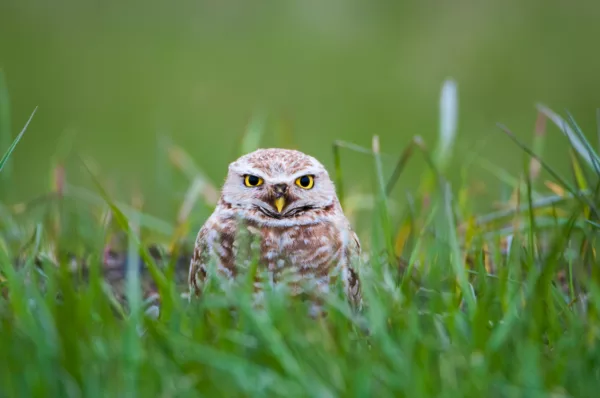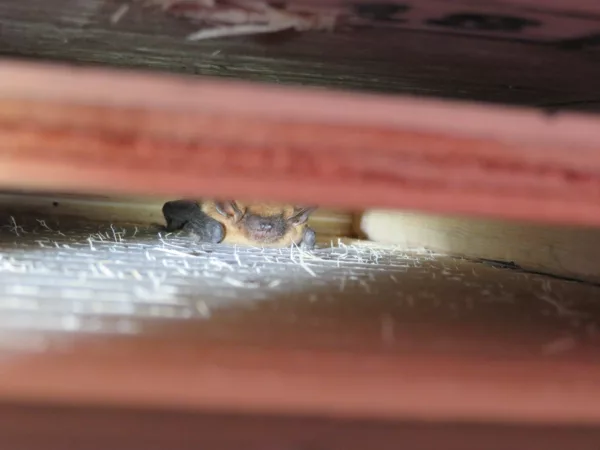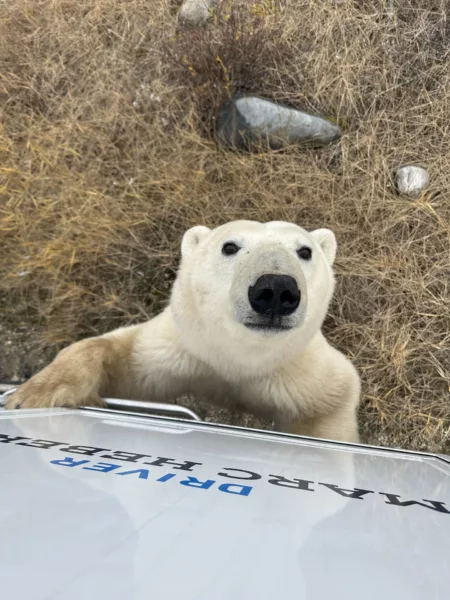Why You Really Shouldn’t Feed Bears

“Psst,” I asked with trepidation and in the hopes that perhaps I had dreamt it, “did you feel that?” We were camping in Whistler and sleeping in a trailer, and I could’ve sworn that I had just felt the entire thing shake violently. I thought it was going to fall off its blocks.
Then it happened again, and my friend and I looked at each other with mixed expressions of curiosity and terror. “Was that a bear?” I questioned hesitantly. Could it really be a bear that was causing the trailer to sway back and forth? I knew Whistler was home to some bears, so it was certainly possible.

Quietly and cautiously, I lifted the window shade and peered outside. “It’s a bear!” I exclaimed in my loudest inside voice as I laid eyes on the giant brown beast that was so close I could have reached outside the window and touched it. We both stared out the window and watched as the bear mulled about outside the trailer. He brushed up against it, causing the swaying feeling we were experiencing.
Moments later, it was gone. Slowly and quietly, I closed the trailer window in case the bear decided to come back later. My friend was about to go outside and see if the bear had damaged anything when I stopped him. I knew that the bear couldn’t have gone far, and I didn’t think going outside was the smart choice. Instead, we double-checked to make sure the door was locked and went back to bed.
In the morning, I realized that, after one too many campfire beverages, we had carelessly left our cooler underneath the trailer. The bear had obviously smelled the meat and cheese inside it because the cooler was wide open and the food was gone. All that remained was a punctured beer can with a large bear claw mark on the front of it.
 Kathryn Anderson
Kathryn Anderson
While this may seem like a funny story to share with you, truthfully, it’s not. I feel awful knowing that we fed a wild animal—unintentionally, but it was dangerous all the same.
Bears are wild animals and they need to hunt and gather their own food. Once they become domesticated, depending on humans for food, they stop fending for themselves. Why would a bear go fishing for salmon if it could dig into a camper’s cooler for brie cheese and prosciutto? Once bears figure out that they can routinely return to the same area for food, they become bolder and less cautious. This leads to several serious problems.
 Kathryn Anderson
Kathryn Anderson
The popular saying, “a fed bear is a dead bear” doesn’t mean that the bear will die as a result of eating human food. The food itself isn’t dangerous—it’s where the food is located that makes it a danger to both humans and bears.
Bears will return to places where they know they can find food. Food left out by a human is often done-so in a populated area, which endangers both the life of the bear and that of other people. Sadly, these bears often end up euthanized because they become a danger to society.
In the wild, black bears are rarely a threat to humans. It’s our actions, intentional or not, that create a dangerous situation. When we leave food out, even in a garbage bin, it brings them out of the woods and into our communities, often resulting in their death.

So, how can we enjoy the great outdoors while respecting the wildlife that calls it home? Quite simply, we must ensure that our food gets stored properly and follow Leave No Trace principles. This means that all scented products must be sealed away in a bear-proof container where bears can’t smell it or get to it. Take all your garbage with you and follow safe bear practices when camping.
If you have ever visited a campground in bear country, you may have noticed bear-proof garbage cans and recycling bins. These have handles to open them, which keeps bears out and helps to discourage bears from coming into populated areas to search for food.
If you are backcountry camping, it’s wise to use a bear bag and hang your food from a tree. Trust me on this one, you don’t want to wake up in the middle of the night to find a bear rocking your tent. It was scary enough in a trailer!

The sight of a bear in the wild can be an exciting one. If you do spot a bear, don’t move toward it or try to feed it. Bears often won’t be dangerous to us unless provoked. In nature, bears are typically afraid of humans and prefer to avoid confrontation. We have that in common.
Remember, both animals and humans call the Earth home. With a little care and attention, we can live together harmoniously. The woods are a bear’s home, and that’s where they will stay if we don’t encourage them into our neighbourhoods. Always respect your environment and leave no trace, especially food.
For more outdoor tips, check out:
The Happy Camper: Freeze Dried On The Go Meals (OTG) Review
How to Clean Your Hiking and Camping Clothes and Gear














